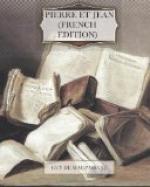Pierre often went to see him and chat with him for an hour after dinner, for he liked Marowsko’s calm look and rare speech, and attributed great depth to his long spells of silence.
A simple gas-burner was alight over the counter crowded with phials. Those in the window were not lighted, from motives of economy. Behind the counter, sitting on a chair with his legs stretched out and crossed, an old man, quite bald, with a large beak of a nose which, as a prolongation of his hairless forehead, gave him a melancholy likeness to a parrot, was sleeping soundly, his chin resting on his breast. He woke at the sound of the shop-bell, and recognising the doctor, came forward to meet him, holding out both hands.
His black frock-coat, streaked with stains of acids and sirups, was much too wide for his lean little person, and looked like a shabby old cassock; and the man spoke with a strong Polish accent which gave the childlike character to his thin voice, the lisping note and intonations of a young thing learning to speak.
Pierre sat down, and Marowsko asked him: “What news, dear doctor?”
“None. Everything as usual, everywhere.”
“You do not look very gay this evening.”
“I am not often gay.”
“Come, come, you must shake that off. Will you try a glass of liqueur?”
“Yes, I do not mind.”
“Then I will give you something new to try. For these two months I have been trying to extract something from currants, of which only a sirup has been made hitherto—well, and I have done it. I have invented a very good liqueur—very good indeed; very good.”
And quite delighted, he went to a cupboard, opened it, and picked out a bottle which he brought forth. He moved and did everything in jerky gestures, always incomplete; he never quite stretched out his arm, nor quite put out his legs; nor made any broad and definite movements. His ideas seemed to be like his actions; he suggested them, promised them, sketched them, hinted at them, but never fully uttered them.
And, indeed, his great end in life seemed to be the concoction of sirups and liqueurs. “A good sirup or a good liqueur is enough to make a fortune,” he would often say.
He had compounded hundreds of these sweet mixtures without ever succeeding in floating one of them. Pierre declared that Marowsko always reminded him of Marat.
Two little glasses were fetched out of the back shop and placed on the mixing-board. Then the two men scrutinized the colour of the fluid by holding it up to the gas.
“A fine ruby,” Pierre declared.
“Isn’t it?” Marowsko’s old parrot-face beamed with satisfaction.
The doctor tasted, smacked his lips, meditated, tasted again, meditated again, and spoke:
“Very good—capital; and quite new in flavour. It is a find, my dear fellow.”
“Ah, really? Well, I am very glad.”




